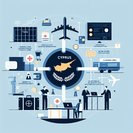
Cyprus took a significant step toward diversifying its migration toolbox on 25 October 2025 with the official roll-out of the new “Visitor – Program Participation” residence permit. Announced by the Deputy Ministry of Migration and International Protection, the initiative targets third-country nationals who wish to attend courses longer than four months at flight schools, maritime academies and other training providers approved by the Deputy Ministry of Shipping or the Department of Civil Aviation. Unlike the classic student visa, the new permit is designed for vocational and professional programmes that fall outside the higher-education sector, filling a long-criticised regulatory gap.
Under the 12-month pilot, only 200 permits will be issued—100 per supervising authority—on a strict first-come, first-served basis. Applicants file in person at the Migration Department’s central office in Nicosia and pay a €70 application fee plus a €70 Aliens Register fee. Successful candidates obtain a temporary residence card valid for the duration of their course and renewable if studies continue. Family reunion is excluded, keeping the focus squarely on the individual trainee.
Officials say the scheme supports Cyprus’ goal of becoming a specialised training hub for shipping and aviation, sectors that already attract multinational companies and expatriate talent. By opening a streamlined, low-volume channel, the government hopes to gauge demand while testing new digital case-management tools slated for wider visa reforms in 2026. Private academies welcomed the move, noting that many prospective students had previously been turned away because they could not meet traditional student-visa criteria tied to university-level study.
For employers, the programme could help address acute skills shortages in Cyprus’ fast-growing maritime cluster and flight-training ecosystem. Companies that sponsor trainees will still need separate work permits if they wish to hire graduates, but officials hinted that a “study-to-work” bridge may be considered if the pilot proves successful. Corporate mobility managers should monitor quota usage closely; once the 200 slots are filled, no further permits will be issued until the scheme is formally reviewed next year.
Practically, HR teams should advise applicants to prepare biometric data, proof of enrolment, financial means of €560 per month, and private health insurance. Processing times are expected to average six to eight weeks, though authorities say a new IT portal could cut that in half once fully operational. In the meantime, the pilot sends an important signal: Cyprus is willing to experiment with targeted migration channels to keep its skills pipeline flowing.
Under the 12-month pilot, only 200 permits will be issued—100 per supervising authority—on a strict first-come, first-served basis. Applicants file in person at the Migration Department’s central office in Nicosia and pay a €70 application fee plus a €70 Aliens Register fee. Successful candidates obtain a temporary residence card valid for the duration of their course and renewable if studies continue. Family reunion is excluded, keeping the focus squarely on the individual trainee.
Officials say the scheme supports Cyprus’ goal of becoming a specialised training hub for shipping and aviation, sectors that already attract multinational companies and expatriate talent. By opening a streamlined, low-volume channel, the government hopes to gauge demand while testing new digital case-management tools slated for wider visa reforms in 2026. Private academies welcomed the move, noting that many prospective students had previously been turned away because they could not meet traditional student-visa criteria tied to university-level study.
For employers, the programme could help address acute skills shortages in Cyprus’ fast-growing maritime cluster and flight-training ecosystem. Companies that sponsor trainees will still need separate work permits if they wish to hire graduates, but officials hinted that a “study-to-work” bridge may be considered if the pilot proves successful. Corporate mobility managers should monitor quota usage closely; once the 200 slots are filled, no further permits will be issued until the scheme is formally reviewed next year.
Practically, HR teams should advise applicants to prepare biometric data, proof of enrolment, financial means of €560 per month, and private health insurance. Processing times are expected to average six to eight weeks, though authorities say a new IT portal could cut that in half once fully operational. In the meantime, the pilot sends an important signal: Cyprus is willing to experiment with targeted migration channels to keep its skills pipeline flowing.







